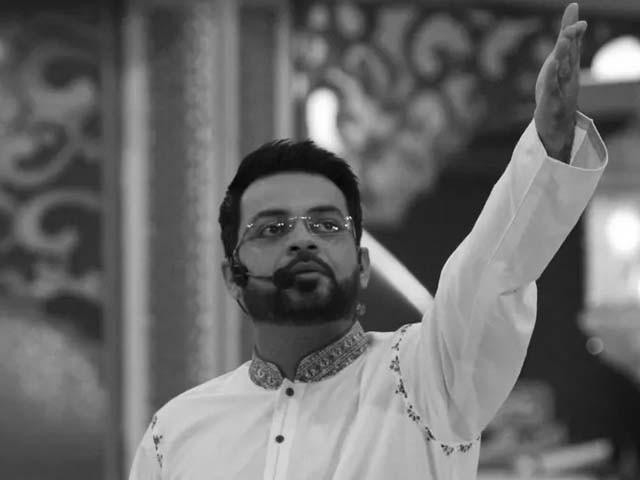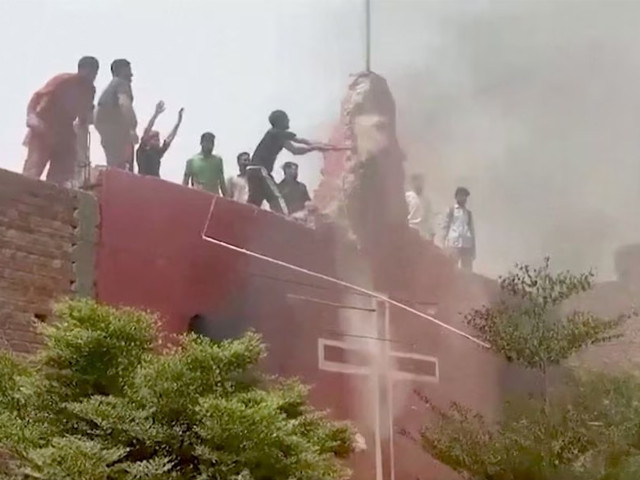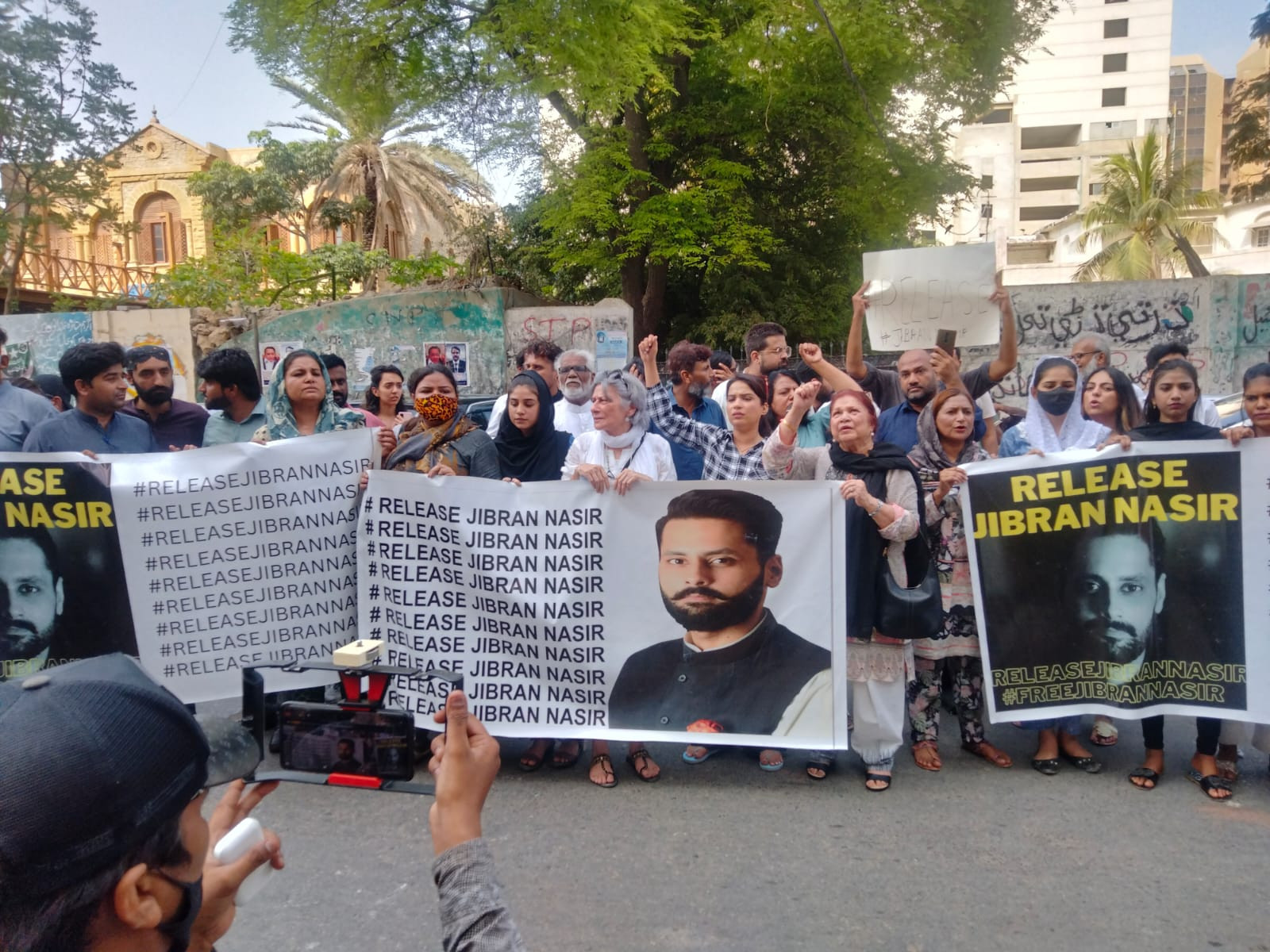
The rise and fall of Aamir Liaquat
Aamir Liaquat, the politician and famous television (TV) personality, has passed away, and the news of his untimely death at the age of 50 is making waves not only in Pakistan but internationally too. Aamir was, after all, a larger than life figure due to his controversies and excesses both as a TV host and a politician. He was admired by some and hated by others, often in equal measure, and was the epitome of the saying: love him or hate him, you cannot ignore him.
Even if you hated him, you perhaps still feel a bit of sadness at the nature of his demise. As I write these sentences, condolences continue to pour in from showbiz celebrities and political figures, including former prime minister Imran Khan. Death, besides being an unshakeable reality, is also a great leveler. Moreover, Aamir was clearly a broken man in his final days as is evident from his last few videos. He had stated he wanted to leave Pakistan after the failure of his controversial third marriage to Dania Shah and the resulting backlash he was receiving after she had released some secretly recorded videos of him. He was also facing a lot of online abuse from Pakistan Tehreek-e-Insaf (PTI) supporters for going against Imran, which undoubtedly further added to his mental toll.
I may have disliked him a lot during his life, and I have very strong reasons for doing so, but that last video he reocrded did soften me a bit towards him because he revealed his sensitive and, to be honest, far less sinister side. A very public fall from the heights of popularity into infamy, and the resulting transformation from an arrogant to a vulnerable person, often arouses some sympathy. Now the suddenness of his death has brought a tragic angle to his life, and personally I feel sad for him. On social media also, I see a lot of statuses urging people to forgive his mistakes and remember the good aspects of his personality.
Having said all this, while I do feel sad about his tragic and untimely demise, at the same time, I must be honest when evaluating his legacy because his life influenced not only the general public but also many aspiring TV hosts and politicians.
I wish I could say that his legacy is a good one, or even one that is mixed. Unfortunately, his legacy is largely troubling and thoroughly controversial. Yes, he was a successful entertainer and for that he should receive some accolades. However, one cannot overlook the fact that his style was largely built on crassness, exaggeration, vulgarity, controversy and at times even rudeness towards his own guests. He knew that controversy and vulgarity, even when they evoke disgust and condemnation, translate into higher ratings.
While his role as an entertainer, despite the controversies, can still be glossed over, one cannot ignore the way he tried to control discourse on religion in Pakistan and how he weaponised it in a dangerous manner. This is perhaps the most troubling part of his legacy, made more potent by the fact that he was also perceived to be a religious scholar.
Yes, he highlighted the plight of Muslims in Myanmar and Indian-occupied Kashmir a lot in his programmes and on social media. However, his negatives in this aspect far outweigh the positives. He openly questioned the religious beliefs of some sects of Islam, which not only helped fuel religious intolerance in society but at times led to ominous and fatal consequences. In September 2008, he openly promoted hate speech against the Ahmadi community on his TV show, which was followed by the murders of prominent Ahmadi individuals within two days of the broadcast. However, no concrete action was taken against him. A few years later, his promotion of hate speech against the same community once again led to another murder, and once again he did not face any serious consequences. Besides spreading hatred against Ahmadis, he also targeted other Pakistani religious minorities on social media, such as mocking Hindu deities.
Aamir also adversely influenced public discourse on the existing blasphemy law by unequivocally framing it as Islamic and portraying its opponents as anti-religion. In 2017, he hurled blasphemy allegations on some missing bloggers and demanded death for them in his TV show, for which he was temporarily banned. This act of hurling baseless allegations was extremely dangerous as it contributed to the current trend of weaponising the existing blasphemy laws for settling other scores. His ban was subsequently lifted but he was barred again from appearing on TV in December 2017. This was because he continued to indulge in hate speech in which, besides spreading religious intolerance, he also accused various individuals of treason. It was clear that Aamir was willing to test the limits to which he could go by inciting religious hate and, by doing so, he was normalising these tactics. He was, of course, helped by the fact that the bans imposed on him were lifted every time. In many ways, he was the trailblazer for the current trend in broadcast journalism where TV anchors can just say anything without adequately supporting it with evidence.
Moreover, Aamir indulged in open sexism and misogynistic behavior, hence contributing towards the normalisation of such thinking in wider society. His tactics ranged from passing vulgar and inappropriate remarks in front of his female guests to openly castigating some women (often liberal, feminist and prominent politicians) on both social media as well as in his TV programmes. His misogynistic approach extended to his own marriages as well, as he used his media power to malign his former wives. His glorification of his third marriage to Dania (clearly more than 30 years younger than him and, according to some interviews, actually a minor) was also extremely objectionable. In some ways, he tried to frame marrying a very young and beautiful girl as evidence of his success and entitlement.
While Aamir’s overall legacy is troubling, I am mindful of the fact that in many ways he was an embodiment of the contradictions and flaws of the society he belonged to. In some ways he contributed to those societal shortcomings, but at the same time he was a product of that very system as well. His persona resonated with a large audience because he was saying what they wanted to hear. I won’t call him a monster but rather a Machiavellian operator who was ready to commercially exploit society’s existing and deep-rooted problematic attitudes.
Rest in peace, Aamir Liaquat.




COMMENTS (4)
Comments are moderated and generally will be posted if they are on-topic and not abusive.
For more information, please see our Comments FAQ